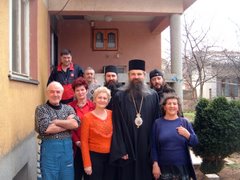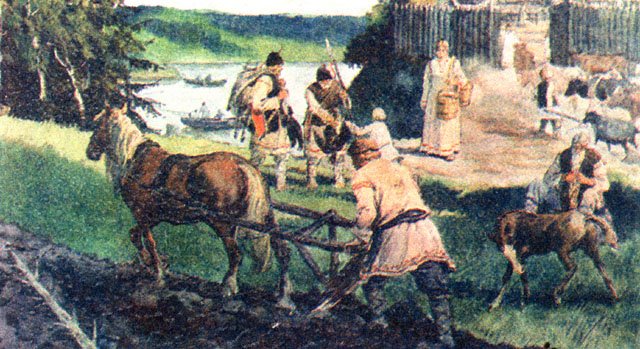Putin's Statement to Europe
President Putin is facing a smear campaign lodged by the western governments to discredit him. His diplomacy and his tact in the face of his adversaries really underscores his commitment to Holy Russia and its allies. In the end, we will recognize him as a great Statesman and the leaders of America as Robber Barons using everything they can to gain the transient economic edge. Russia is not gambling but the west is, and the west will lose this round. Please stop drinking your martinis and try to come sober to the table when discussing policies that effect us little people.
Europe has nothing to fear from Russia
By Vladimir Putin
Published: November 21 2006 19:41 Last updated: November 21 2006 19:41
I would like to share my views on relations between Russia and the European Union ahead of Friday’s summit in Helsinki, primarily their strategic aspects.
Russia is a natural member of the “European family” in spirit, history and culture. Though it is not striving to join the EU, when I consider the future of our relations I do not see any areas that are not open to equal, strategic co-operation based on common objectives and values. When speaking of common values, we should also respect the historical diversity of European civilisation. It would be useless and wrong to try to force artificial “standards” on each other.
In the past few years, the EU and Russia have become important political and economic partners. Such co-operation should not be used to the detriment of relations with other countries and regions. I personally believe this policy will benefit everyone, including the EU. Our relations are becoming mature and well structured. Co-operation between our industries is gathering momentum, and our justice and interior ministries are participating energetically in dialogue. We are promoting scientific, cultural and humanitarian contacts in a streamlined and systematic manner with the goal of establishing four areas of common interest: economic issues and the environment; issues of freedom, security and justice; external security, including crisis management and non-proliferation; and research and education, including cultural aspects.
We also have similar approaches to issues of international security. Russia and the EU stand for strengthening universal regimes, primarily the non-proliferation regime. In spite of tactical differences, we have a common desire to find a fair solution to the most complicated international problems, such as the Middle East conflict or the issue of the Iranian “nuclear dossier”.
Russia is closely watching the EU’s evolution, not least because the pace of development of our relations and their future depend largely on changes in the EU. The Union could remain a predominantly intergovernmental association or acquire supranational functions. Russia wants its largest neighbour to be stable and predictable, and hopes that changes and expansion will not erode the EU’s uniform legal framework, primarily in the sphere of ensuring equal rights to all EU people irrespective of country of origin, nationality and religion.
We are developing relations with the EU with a view to the future, not the present day. I firmly believe that dialogue should not be limited merely to technical or “industrial” issues such as quotas, tariffs and anti-dumping and technical standards, although these are important and should be addressed jointly. Rather, I think we should first decide what we want from each other over the next several decades and what we can do for our people.
Russia’s approach to the future of European integration is well known. Our main objective is to create a common economic space and guarantee freedom of movement for our people, as advocated by our business, cultural and scientific communities. A long and complicated road leads to the fulfilment of these objectives, which are nevertheless quite feasible. Many partners in the EU share this approach.
We will soon start working together on a new accord to replace the partnership and co-operation agreement expiring in 2007. We hope the EU-Russia summit in November will give a boost to the negotiations. Our dialogue so far shows that we see eye-to-eye on many provisions of the future agreement. Russia thinks it should be a compact but politically significant document geared toward the future and stipulating clearly defined goals and mechanisms for equal co-operation.
I hope that joint work on this document will bring Russia and the EU closer together. Future talks should not deteriorate into an exchange of complaints. We will not be able to turn a new leaf in the history of our co-operation if we succumb to fear of growing interdependence. Those who warn of the danger of Europe becoming dependent on Russia see Russia-EU relations in black and white and try to fit them into the obsolete mould of “friend or foe”. Such stereotypes have little in common with reality, but their persistent influence on political thinking and practice runs the risk of creating fresh divisions in Europe. The past must not be used to divide us, because we cannot rewrite history. Our current goal is to join forces so that Russia and the EU can build a common future as partners and allies. Russia is prepared to work for this and I hope a constructive approach will also prevail in the EU.
The writer is president of Russia
Copyright The Financial Times Limited 2006
Print article
Email article
Order reprints
Track this story
News alerts
Email - create a keyword alert on the subject of this topic
Desktop - download our application to receive instant alerts on this topic
Email summaries
Email - start your day with daily email briefing on this topic
RSS feeds
RSS - Track this news topic using our feeds

















